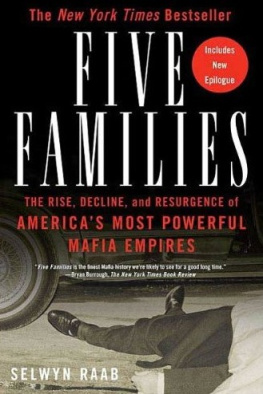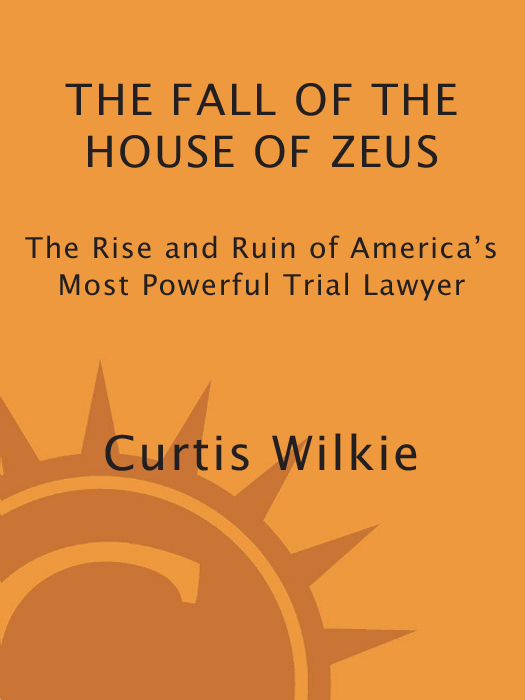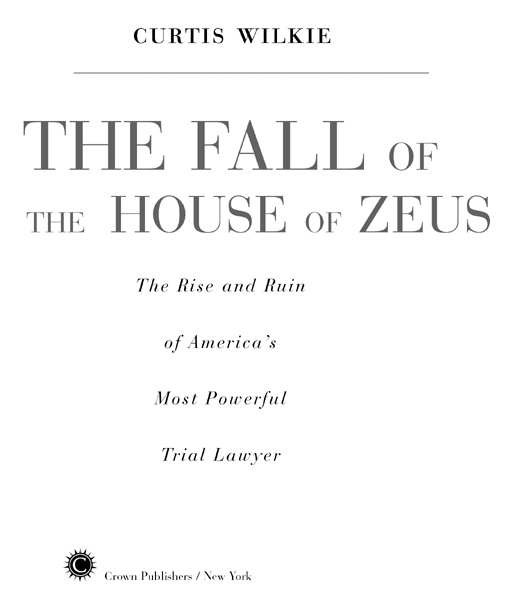ALSO BY CURTIS WILKIE
Dixie: A Personal Odyssey Through Events That
Shaped the Modern South
Arkansas Mischief: The Birth of a National Scandal
(with Jim McDougal)
Copyright 2010 by Curtis Wilkie
All rights reserved.
Published in the United States by Crown Publishers, an imprint of the Crown Publishing Group, a division of Random House, Inc., New York.
www.crownpublishing.com
CROWN and the Crown colophon are registered trademarks of Random House, Inc.
Library of Congress Cataloging-in-Publication Data
Wilkie, Curtis.
The fall of the house of Zeus / Curtis Wilkie.1st ed.
p. cm.
1. Scruggs, Dickie. 2. LawyersMississippiBiography. 3. Judicial corruptionMississippiHistory I. Scruggs, Dickie. II. Title.
KF373.S342W55 2010
340.092dc22
[B]
2010004503
eISBN: 978-0-307-46072-1
See for photograph insert credits.
v3.1
For Nancy
Contents
Principal Characters
The Defendants
Dick Scruggs, wealthy trial lawyer and engineer of groundbreaking tobacco lititgation
Zach Scruggs, his son and law partner
Sid Backstrom, junior partner in the Scruggs Law Firm
Tim Balducci, ambitious lawyer who envisioned a superfirm
Steve Patterson, former state auditor, Democratic chairman, and Balduccis partner
Joey Langston, prominent lawyer specializing in criminal defense and plaintiff lawsuits
Bobby DeLaughter, state judge and former prosecutor who helped convict assassin Byron De La Beckwith
Their Antagonists
Johnny Jones, Jackson lawyer who sued Scruggs Katrina Group
Grady Tollison, Oxford attorney who represented Jones
Alwyn Luckey, former Scruggs partner in Asbestos Group
Roberts Wilson, former member of Asbestos Group
Charlie Merkel, Clarksdale attorney who represented both Luckey and Wilson in lawsuits against Scruggs
George Dale, state insurance commissioner driven from office by Scruggs
Henry Lackey, state judge who reported improper approach by Balducci
The Prosecutors
Jim Greenlee, U.S. attorney in Oxford
John Hailman, prosecutor who initiated the investigation before retiring
Tom Dawson, chief deputy in U.S. Attorneys Office
Bob Norman, who took charge of the Scruggs case after Dawsons retirement
The Defense Lawyers
John Keker, San Francisco attorney representing Dick Scruggs
Mike Moore, former Mississippi attorney general and close friend of Scruggs who represented Zach Scruggs
Frank Trapp, Jackson attorney representing Sid Backstrom
Rhea Tannehill, Oxford friend and attorney for Backstrom
Tony Farese, attorney who first represented Zach Scruggs, and then, Langston
The Players in The Force
Trent Lott, Scruggss brother-in-law and onetime Republican majority leader in the U.S. Senate
Tom Anderson, Lotts longtime associate in Washington
P. L. Blake, a figure in their Mississippi network
Ed Peters, former district attorney in Jackson
Pete Johnson, former state auditor
The Political Figures Outside The Force
Jim Hood, attorney general of Mississippi
Danny Cupit, former Democratic chairman and influential Jackson attorney
Joe Biden, former U.S. senator from Delaware, now vice-president of the United States
The Judge
Neal Biggers, senior U.S. district judge in Oxford
The Wife, Mother, and Sister-in-Law
Diane Scruggs, Dicks wife; Zachs mother; Trents sister-in-law
The Chancellor
Robert Khayat, leader of the University of Mississippi for fourteen years
Abide in silence, the cloud-gatherer Zeus said, and obey what I say, for now all the gods of Olympus will be of no avail when I come closer and lay my invincible hands upon you. His queen, Hera, was afraid, and she sat down in silence, wrenching her heart to obedience, and the gods in heaven were troubled in the House of Zeus.
Homers The Iliad
PREFACE
A long with much of Oxford, I was savoring the news that Ole Miss had secured the services of football coach Houston Nutt, five days after Thanksgiving 2007, when that headline was overtaken by a breaking story with greater significance. Rick Cleveland, a sports columnist for Jacksons Clarion-Ledger in town for Nutts press conference, called me to say, Your buddys been indicted. I could find the first, sketchy details on his newspapers website: Dick Scruggs had just been arraigned in federal court on charges of bribing a judge.
The news of the indictment of Scruggs, a take-no-prisoners trial lawyer of international repute, a power player in state and national politics, and a major benefactor of the University of Mississippi, was shocking. My initial reaction was similar to that of others who knew Scruggs. As John Grisham told The Wall Street Journal, This doesnt sound like the Dickie Scruggs that I know. When you know Dickie and how successful he has been, you could not believe he would be involved in such a boneheaded bribery scam that is not in the least bit sophisticated.
In the two decades since Scruggs first drew blood from the asbestos industry and then brought Big Tobacco to its knees in litigation that produced hundreds of millions of dollars for himself and his clients, he had developed powerful enemies. At the time, he was locked in an epic struggle with his most formidable opponent to datethe American insurance industryin a series of bristling lawsuits growing out of Hurricane Katrina. Though he had backed a few Republicans (most notably his brother-in-law, Mississippi senator Trent Lott), Scruggs was best known for his support of Democratic candidates. Upon learning of his indictment, there were celebrations in the corridors of chambers of commerce and Republican headquarters across the country.
Scruggss indictment came while Mississippi was recoiling from Lotts announcement, only the day before, that he would resign from office. As a Republican leader in the Senate, Lott was one of the most influential men in Washington. If Lotts resignation and Scruggss arrest were coincidental, it strained credibility.
As the investigation widened to draw in other important figures, the story grew even more intriguing. The chief U.S. attorney, Jim Greenlee, called it a Greek tragedy.
In nearly forty years as a newspaper reporter, I had covered the civil rights movement, eight presidential campaigns, and numerous overseas conflicts. Even though I had retired at the conclusion of the 2000 election and become a member of the faculty at the University of Mississippi, it occurred to me that this might be the story of my lifetime.
Two months after the first arrests in the case, with a trial quickly approaching, I dropped Dick a note telling him of my interest in writing a book. I appreciate that you have to be guarded in anything you say regarding the case, but at some point I would hope we could talk about it, I wrote. I still remember your candor and cooperation when we first met ten years ago and I was working on a story for TheBoston Globe that dealt with the Luckey-Wilson case. Ten years later, the repercussions from that case were factors in Scruggss current dilemma. In the intervening years, Dick and I had both moved to Oxford, and I had gotten to know him better.













